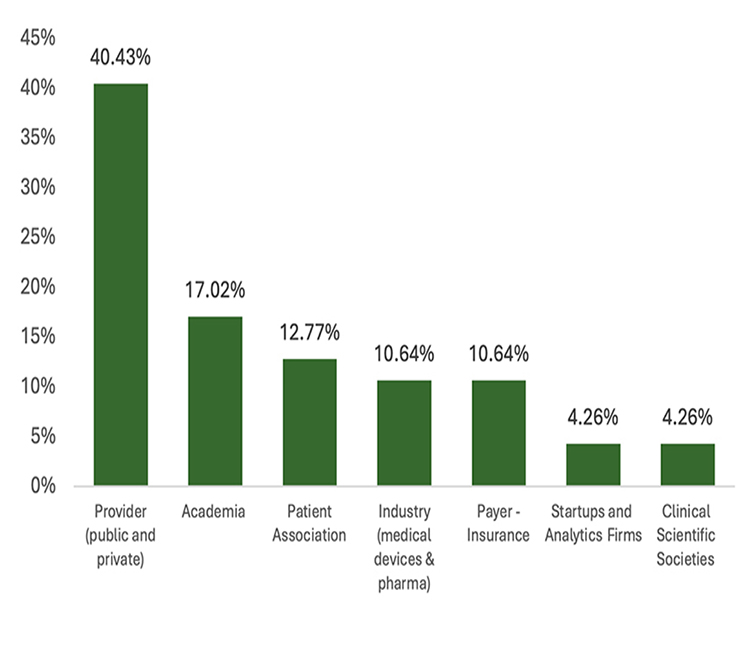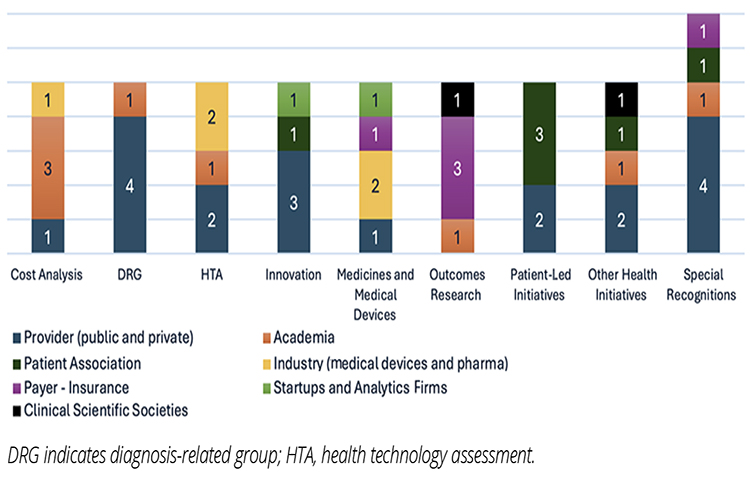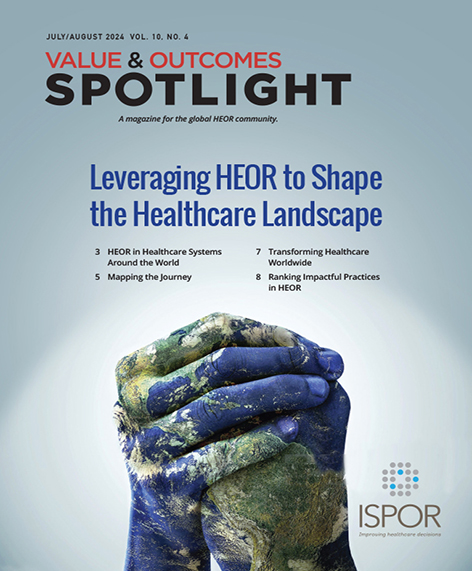Advancing ISPOR’s Mission Through Local Chapters
- Insights From the ISPOR Chile National Ranking of Impactful Practices in Health Economics
Daniela Paredes-Fernández, MPH, ISPOR Chile Chapter President
Why develop a national ranking of impactful practices from ISPOR?
Chile is an intermediate country in terms of its maturity in health technology assessment (HTA). At the regulatory level, there is no national body that organizes evaluation processes in a structured manner. Instead, its application occurs at the level of funding bodies. These funds organize mainly interim evidence evaluation schemes, in which industry often participates by presenting studies. Despite efforts from academia and key opinion leaders, Chile lacks a structured HTA system.
Regarding resource creation, capacity building for developing skills in HTA is concentrated in universities. However, there are a few formal educational programs that specialize in management, public health, and epidemiology, providing tools to enthusiastic professionals from the health sector who later apply these to the field of health economics. Additionally, the concentration of knowledge within academia has created a gap between some professional groups engaged in practical health system tasks and the academic segment, revealing a disconnect between providers, insurers, and the educational sector.
"The ISPOR Chile National Ranking aims to highlight the efforts of stakeholders currently applying HEOR methods to practical, everyday problems."
Those responsible for purchasing within the health system are currently supporting the implementation of the diagnosis-related group payment mechanism. They have limited capacity to implement risk-sharing agreements or other innovative schemes and insufficient ability to contribute to the HTA process in coordination with regulatory functions.
The lack of an HTA system in the country, the limited coordination between academia and regulatory bodies to generate evidence and local capacities, and fixed funding schemes have led to solutions emerging from stakeholders, emphasizing the need for ISPOR’s international focus. In this landscape, concern arises among providers, private insurers, industry, patient groups, and startups to support their decisions with evidence.
Traditionally, health economics and outcomes research (HEOR) has been applied by HTA bodies, Ministries of Health, Social Security, and universities. However, HEOR’s application extends beyond traditional stakeholders in contexts like Chile.
Thus, the ISPOR Chile National Ranking, organized by the new board of directors, aims to highlight the efforts of stakeholders currently applying HEOR methods to practical, everyday problems. The Chilean chapter proposes leveraging a work strategy with these new stakeholders to strengthen their capabilities.
Highlights from the ISPOR Chile national ranking
This biennial initiative is structured into a general ranking and various categories, where different health-related organizations within the healthcare ecosystem submitted their impactful practices across 8 categories, following rigorous submission guidelines. The evaluation process, conducted with a double-masked technique, meticulously weighs criteria for closing gaps through health economics tools, the technical characterization of impactful practices, and the benefits to both organizations and patients. A distinguished panel of judges, including prominent national and international experts in health science and economics (eg, academics, researchers, and leaders from other Latin American chapters of ISPOR), evaluated the initiatives, ensuring a comprehensive and high-quality analysis.
This initiative aimed to recognize the diversity of innovative approaches and creative solutions employing HEOR tools deployed by emerging stakeholders in the discipline’s application. Identifying these stakeholders and their impactful practices allowed for the dissemination of often quietly performed practices within the community and the promotion of peer learning. Additionally, awards were given to attract talent to ISPOR, providing access to society memberships and short courses to enhance participants’ capabilities and methodological rigor.
What impactful practices were awarded nationally?
More than 500 people joined this initiative. Each category awarded the top 5 impactful practices. Nineteen (40.43%) of the awarded organizations corresponded to public and private providers, followed by 8 (17.02%) practices from academia. Six (12.77%) awards were granted to patient associations.
Awards sorted by type of stakeholder.

Below, we highlight the 8 organizations that achieved first place in their category.
In the Management of Medicines and Medical Devices category, the award was given to the collaborative work between a private insurer (Seguros SURA SA) and the Chilean startup YAPP to improve access to affordable medications for patients. This initiative provides access to a digital platform for nontraditional pharmacies to reduce out-of-pocket medication expenses for Chilean families, optimize reimbursement processes, strengthen the financial sustainability of local pharmacies, and promote fair competition.
In the Diagnosis-Related Groups category, the award went to a private provider holding for implementing an efficiency management model based on diagnosis-related group use in RedSalud Clinics. This system’s adoption has resulted in significant benefits, such as reduced average critical care unit length of stay, facilitated activity standardization, improved patient management, and network learning for knowledge transfer.
In the Other Health Impact Initiatives category, the award was given to a health policy analysis research project that helps mitigate factors explaining the over-medicalization of childbirth in Chile (ie, “Evidence and Recommendations for a Public Policy Ensuring Quality Childbirth Care” by the Chilean Society for Childbirth SOCHIPAR). This impactful practice addresses one of the clearest examples of supply-induced demand in Chile: the high rate of unnecessary cesareans. Evidence supports the idea that midwife-led units offer care with fewer medical interventions and are more cost-effective.
In the Health Technology Assessment category, the award went to the Universidad Austral for its practice of advanced tools for pharmacotherapy safety. This interdisciplinary work developed a supportive technological solution for establishing safe pharmacotherapeutic prescriptions. By implementing a real-time alert system, this practice aims to avoid unnecessary risks and therapeutic failures associated with inappropriate prescriptions.
Classification of winning stakeholders by category.

In the Health Innovation category, Buho Chile was awarded for its system to optimize medication procurement and delivery through a technological algorithm that automatically compares prices among multiple pharmacies to improve access to lower-priced medications with home delivery across Chile. The wide price variability among pharmacies and the population’s lack of tools for price comparison highlight the need for interventions that facilitate access to lower-priced medications.
"This initiative aimed to recognize the diversity of innovative approaches and creative solutions employing HEOR tools deployed by emerging stakeholders in the discipline’s application."
In the Cost Analysis category, Roche was awarded for the merit of its cost-minimization and budget impact analysis of adopting the subcutaneous combination of trastuzumab and pertuzumab for treating HER2+ breast cancer in the Chilean public health system. This practice underscores the strategic role of cost-minimization studies from a health economics perspective, as they explore ways to further improve expenditure efficiency even in contexts with adequate treatment coverage.
In the Outcomes Research category, the award went to a private insurer (CONSALUD) for a practice focused on measuring economic sustainability and care quality through monitoring critical emergencies. Through active support, the insurer identifies inappropriate administrative or clinical practices that could lead to service overutilization, thus contributing to the system’s financial efficiency.
In the Patient-Led Initiatives category, the award was given to the “Hospital in Your Neighborhood” initiative led by the public hospital of La Florida in partnership with the Patient Advisory Council. This practice highlights the importance of involving the community in identifying needs and improving care quality. Instances where users lead and coordinate activities to foster collaboration between the community and the hospital resulted in better resource utilization and care more focused on users’ real needs, thus contributing to efficiency and equity in health service delivery.
The national ranking strategy has brought ISPOR and Chile closer to new stakeholders with whom we aim to build alliances and initiate innovative projects to improve national HTA. It has laid the foundations for a culture of celebrating evidence-based health management, bringing us closer to the Ministry of Health, the National Health Fund, and other decentralized bodies and strengthened ties with emerging stakeholders through joint projects and technical support. The initiative’s novel approach has also garnered attention in the press. For more information, follow the discussion on LinkedIn here.

